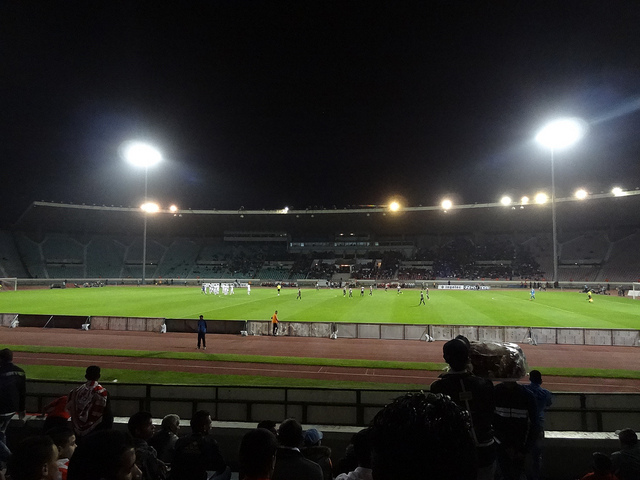Updated
Equalizing the Playing Field – FIFA 2026 Bidding Process — Ambassador Edward M. Gabriel (ret.)

Wydad Casablanca v Maghreb Tetouan at Stade Mohamed V Photo: Groundhopping Merseburg
Ambassador Edward M. Gabriel (ret.)
March 23, 2018
 At first glance, one has to wonder if the competition to host the 2026 soccer (football) World Cup can even be competitive. It’s the United 2026 joint bid of the United States, Mexico, and Canada versus Morocco. With a combined GDP of more than $21 trillion, the US-led consortium appears to have an overwhelming advantage over Morocco, a country the size of California with a GDP of just over $100 billion. It sounds like a real David and Goliath battle. However, it is also a perfect example of why FIFA should take into consideration a higher vision that goes beyond hosting 48 soccer teams in 32 days, and how hosting the competition can advance the development and infrastructure goals of the winning bid.
At first glance, one has to wonder if the competition to host the 2026 soccer (football) World Cup can even be competitive. It’s the United 2026 joint bid of the United States, Mexico, and Canada versus Morocco. With a combined GDP of more than $21 trillion, the US-led consortium appears to have an overwhelming advantage over Morocco, a country the size of California with a GDP of just over $100 billion. It sounds like a real David and Goliath battle. However, it is also a perfect example of why FIFA should take into consideration a higher vision that goes beyond hosting 48 soccer teams in 32 days, and how hosting the competition can advance the development and infrastructure goals of the winning bid.
A five-person task force will make inspection visits and then score the proposals of both bidders before FIFA member countries vote. Seventy percent of the scoring leans heavy on the strength of existing infrastructure (50% allocated to stadiums), while the remaining 30% is based upon proposed costs and revenues. The United Bid appears to have the following advantages:
- Well-developed infrastructure in large cities with superb transportation networks, stadiums, hotels and tourist facilities, including 16 luxury NFL football stadiums.
- Experience counts. The United States, Mexico and Canada have hosted a combined 3 FIFA World Cups. With more teams competing than ever before (48) and 80 games in 32 days, experience may matter more than at any time before.
- The potential market in North America is huge, with a population of a half billion people. FIFA plans to earn $300M more from the North American venue.
Morocco has its advantages as well:
- It offers a compact solution: one time zone, one currency, and all host cities are within a 350mile radius from Casablanca, thus reducing logistical challenges. And more than half of the competing teams are within the same time zone so the times of the games better match up with the football loving fans of Europe.
- Morocco is a football haven, being the first African country to qualify for the FIFA World Cup in 1970 through African qualification, and the first African country to reach the 2nd round of the FIFA World Cup in 1986. Bid chairman, Moulay Hafid Elalamy remarked that this has bred an amazing passion and knowledge for the game. Morocco has also hosted two successful FIFA Club World Cups (in 2013 and 2014) and the most recent African Cup of Nations (2018).
- The global unpopularity of Donald Trump. Countries may be reluctant to give the US the bragging rights of winning the World Cup during his presidency.
- Morocco’s infrastructure is in great need of an upgrade, including its stadiums.
Yes, you read it correctly; the need to invest in the infrastructure of the country should be an advantage, rather than disadvantage, at least for countries with proven records when it comes to developing their infrastructure. One Moroccan official recently remarked that for Morocco to meet the needs of the World Cup, it would have to become one huge ‘building site’.
The seating capacity of the Morocco’s stadiums is woefully undersized, and all of them will require significant upgrades. Hotel capacity has more than doubled since 2003 to 110,000 hotel rooms but will need to expand by 70% by 2026. Upgrades to other infrastructure will also be of paramount importance in order to present Morocco favorably to the football-loving world in the next decade. Morocco understands the challenge and has committed to spend nearly $16 billion in new infrastructure in support of its bid.
Morocco also has the track record to do it. According to the World Bank, it is ranked 87th in per capita income in the world. However, it is 39th in global infrastructure, according to the Statistical Global index. All countries that were rated higher in infrastructure are significantly richer than Morocco. The country has developed an interconnected system of expressways, rail transportation, modern ports, and advanced Internet technology. It will inaugurate the first high-speed train in Africa this summer, something America has yet to achieve.
The World Cup should be more than a game. It should also pride itself on contributing to the advancement of developing countries by using its application process as a way of expediting the efforts of those countries with proven track records to advance the infrastructure needs and economic prosperity of their citizens. Morocco is definitely hitting above its weight by all measurements and deserves to be given extra credit in its FIFA bid for its infrastructure success.